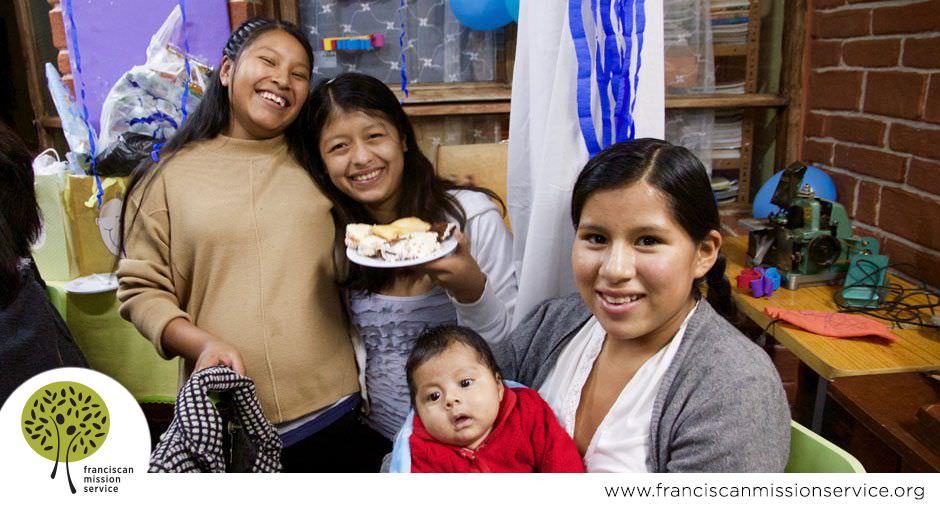A Time to Rejoice

Editor’s note: Missioner Allison Dethlefs recounts a celebration at one of her service sites that gave her insight into her community’s strength and ability to turn trauma into joy.
For the past year-and-a-half I have been volunteering at a girl’s home called Nuestra Casa (Our House). The home takes in girls ages 5-18 who have experienced some sort of sexual violence or abuse, most often at the hands of relatives or other people close to them. While their cases are being processed to determine where they will live, the girls are offered a safe space at Nuestra Casa to start their process of recovery.
Because of their situations, it is not uncommon for a girl to arrive at Nuestra Casa either pregnant–usually through a situation of rape–or with a newborn baby. Recently, we received two such cases: 11-year-old Carlita* with her three-day-old son and 15-year-old Anabel*, who was four months pregnant when she arrived and is due to give birth this month.
One Tuesday night when I arrived at the home to give my usual biweekly Zumba lesson, Anabel approached me and offered me a handmade card. I opened it up and saw that it was an invitation to her baby shower the next evening. I looked around the room and several other things clicked into place: the blue balloons the girls were blowing up, the little baby decorations in various stages of completions strewn across a table filled with craft supplies, the girls baking in the kitchen. I felt my heart swell with the excitement and hope of it all.
The next night, my fellow missioner, Catherine, and I attended the shower, which turned out to be a wonderful celebration that brought together all of the people who were involved with the home. Even Anabel’s mother and younger and sisters were able to come. The festivities started with some skits and activities lead by a local motivational acting troupe. Then we had food and cake made by the girls, and Anabel got to open all of her gifts. Finally, we ended the night with dancing to traditional Bolivian folk music (and a little bit of Zumba.)

The girls from Nuestra Casa show off the block tower they made with a visiting motivational acting troupe
One of the most beautiful and heartbreaking moments of the evening was when Anabel’s mother, a woman who speaks almost entirely in Quechua, got up and, through wracking sobs, thanked the home for caring for her daughter and giving her so much that she, herself, couldn’t provide. I couldn’t even begin to imagine what this mother was going through, but I was amazed by her courage and gratitude.
When I reflect on this night, I am struck by how easily Anabel’s pregnancy could have been surrounded with sorrow, disapproval, or pity. How easy might it be for outsiders–for me–to look at a young girl, pregnant through a situation of familial rape, and see only darkness and misfortune. But there we were celebrating Anabel, celebrating the new life she was going to bring into this world. The home was able to transform a girl who might only have been seen as a victim into a heroine, and a baby who was the result of a traumatic experience into the subject of joyful anticipation.
This ability to celebrate and give thanks in the midst of hardship, which I have seen so often at the girls’ home and in the lives of the people I interact with here, was and is a beautiful testament to the resilience of the Bolivian people. It also served as a reminder to me, a person of great privilege, that suffering and hardship do not need to be afforded the last word and should never be the end of the story.
*Names have been changed for the girls’ protection
Reflection question: How can you look for the hidden strengths and resilience in yourself and those around you?
Tagged in:

